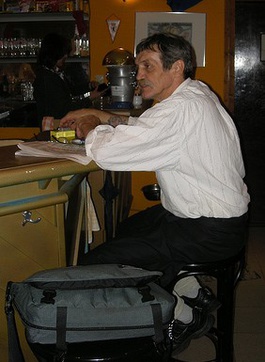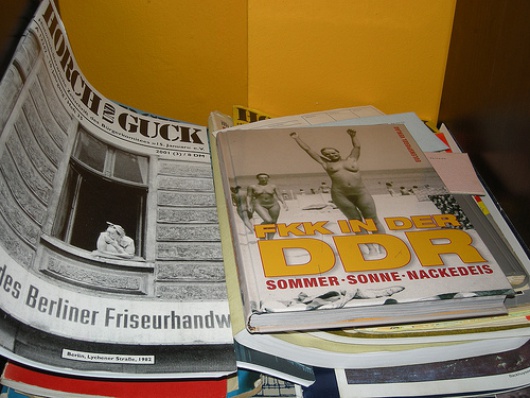
Zur Firma, Berlin’s Stasi-themed bar
Published on
Translation by:
Nabeelah Shabbir‘The Company’ opened in Berlin in July, not far from where the former east German state security ministry lay. How to sell beer and wustel at the expense of history
The kneipe (restaurant) is not very easy to find. Take the metro until Magdalenenstraße. Now you are in Stasi zone, in the neigbourhood of Lichtenberg, near the museum dedicated to the well-known secret police. Our pub is ten minutes away, in the street parallel, to one side of the museum. Normannenstraße  is small, nothing special, until you spot three red signs: Ost-Deustsche Küche ('East German Kitchen'), Restaurant Zur Firma der Konspirative Treff ('The Company restaurant to meet conspirers'), and the sad but famed Stasi slogan: Kommen Sie zu uns sonst kommen wir su Ihnen! ('Come to us otherwise we’ll come to you!').
is small, nothing special, until you spot three red signs: Ost-Deustsche Küche ('East German Kitchen'), Restaurant Zur Firma der Konspirative Treff ('The Company restaurant to meet conspirers'), and the sad but famed Stasi slogan: Kommen Sie zu uns sonst kommen wir su Ihnen! ('Come to us otherwise we’ll come to you!').
Press and polemic
 One warning before entering. The restaurant has been open since July, but the press have spoken about it more than enough. Websites like repubblica.it, spiegel.de, time.com, bild.de, tagesspiegel.de, welt.de, to cite just a few, have dedicated plenty of headlines to the new bar on the block. Amongst others, they speak of security cameras, DDR typewriters to edit the infamous Stasi reports, a joint-puffing mannequin in uniform and a discount card for Mitarbeiter (collaborators, aka regular clients). Another warning: expectations. Hang out in the German capital for a while and it won’t be long before you catch sight of the numerous themed pubs and restaurants. Add a sprinkle of media hype to this ingredient, shake it all up and you have me, standing by the entrance, feeling like I am about to enter a Hard Rock Café, modestly themed a la Stasi. What is this place that has garnered all this controversy? A report from Der Spiegel talks about how Siegfried Reiprich, head of educational projects for the museum of Stasi prisons ('Stasi Memorial Hohenschönhausen'), damned it as ‘insulting the victims’, denouncing the predominant ignorance of German youth.
One warning before entering. The restaurant has been open since July, but the press have spoken about it more than enough. Websites like repubblica.it, spiegel.de, time.com, bild.de, tagesspiegel.de, welt.de, to cite just a few, have dedicated plenty of headlines to the new bar on the block. Amongst others, they speak of security cameras, DDR typewriters to edit the infamous Stasi reports, a joint-puffing mannequin in uniform and a discount card for Mitarbeiter (collaborators, aka regular clients). Another warning: expectations. Hang out in the German capital for a while and it won’t be long before you catch sight of the numerous themed pubs and restaurants. Add a sprinkle of media hype to this ingredient, shake it all up and you have me, standing by the entrance, feeling like I am about to enter a Hard Rock Café, modestly themed a la Stasi. What is this place that has garnered all this controversy? A report from Der Spiegel talks about how Siegfried Reiprich, head of educational projects for the museum of Stasi prisons ('Stasi Memorial Hohenschönhausen'), damned it as ‘insulting the victims’, denouncing the predominant ignorance of German youth.
Shelf of relics
 Sitting on a balcony, I leave who I am behind. Time to go eastern. The sausage and potato salad that I order with my beer costs no more than four euros in total. Instead of a menu, there is a leaflet listing the dishes of the day. Eine konspirative Speisekarte! ('A secret menu!'), a customer exclaims beside me. One of the two owners, 50-year-old Wolfgang Schmelz, describes the restaurant as ‘a pub inspired by a specific theme.’ A good idea to help it emerge out of the competitive world of the other Berlin locals. The idea, he goes on, came to him when he was at the pub with friends, without having really thought too much about it. Once it was discovered that his colleague had perhaps collaborated with the Stasi, the latter resigned.
Sitting on a balcony, I leave who I am behind. Time to go eastern. The sausage and potato salad that I order with my beer costs no more than four euros in total. Instead of a menu, there is a leaflet listing the dishes of the day. Eine konspirative Speisekarte! ('A secret menu!'), a customer exclaims beside me. One of the two owners, 50-year-old Wolfgang Schmelz, describes the restaurant as ‘a pub inspired by a specific theme.’ A good idea to help it emerge out of the competitive world of the other Berlin locals. The idea, he goes on, came to him when he was at the pub with friends, without having really thought too much about it. Once it was discovered that his colleague had perhaps collaborated with the Stasi, the latter resigned.
The DDR ‘will go on forever’
Wolfgang shows me the newspaper articles which have discussed the restaurant, including an article from French daily Liberation. ‘I used to save them all at the beginning,’ he says, satisfied, ‘but now there are too many and they always talk about the same things. But it’s all in the name of publicity,’ he concludes. The bar is small, austere. Yellow walls, a red bar and black stools evoke the colours of the German flag. The relics almost disappear amidst the anonymity of the atmosphere. I ask where all these things were bought. ‘Almost all of them on ebay,’ Wolfgang replies. Many are modern trinkets. ‘The customers also bring stuff,’ he says, showing me a piece of furniture where you can find a bit of everything: old passports and ID cards, cameras, telephones, red plastic carnations, newspapers from the era and books, including a huge photograph album which commemorates thirty-five years of the DDR (east German republic), which according to the introduction, ‘will go on forever.’ The book was published in 1985.
So, is it a pub which could offend victims? It has cropped up now in the former Café Germania, where for many years, nostalgic skinheads would meet up. Today it’s a tourist spot and some kind of souvenir swapshop between the locals. Perhaps that’s where it’s ripe to talk about the Stasi, and as the furniture count keeps growing, the restaurant-bar will become more mainstream.
Translated from Una birra con la Stasi



